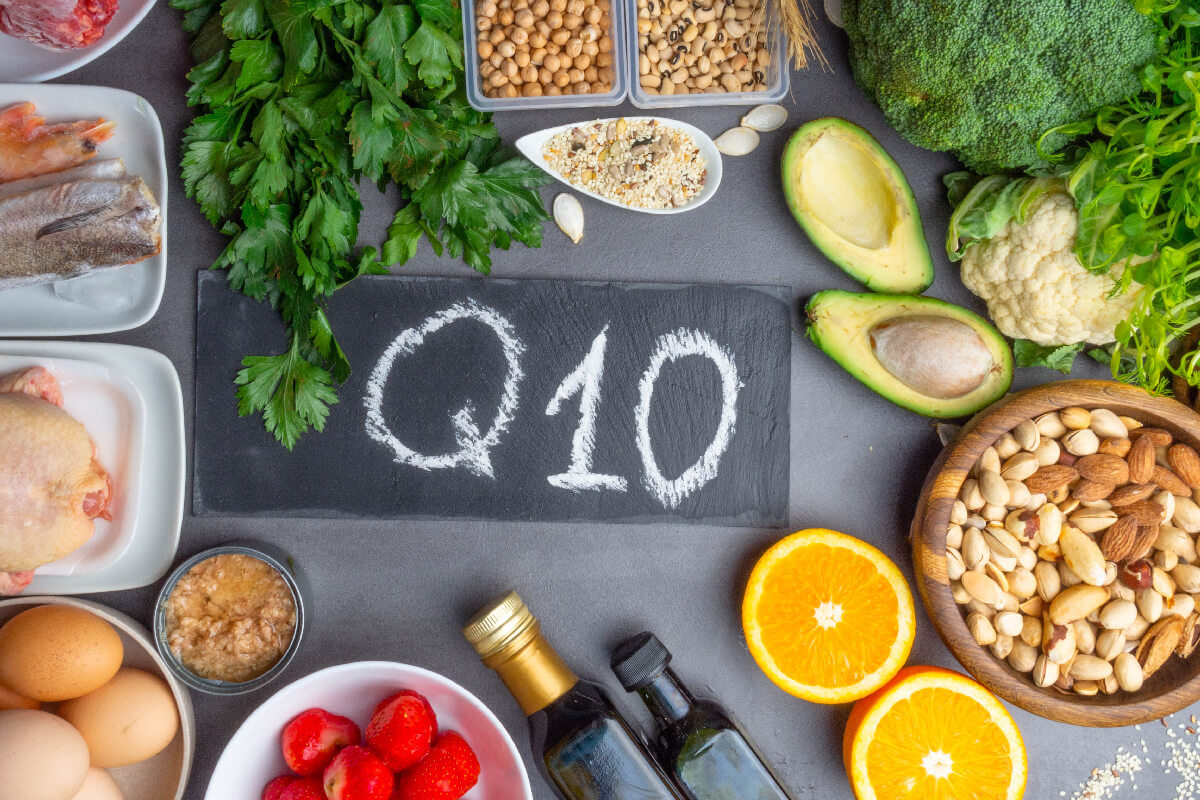What is CoQ10?
Coenzyme Q10 (CoQ10) is a naturally occurring molecule that assists body enzymes in performing their roles. Coenzyme Q10 (CoQ10) functions as an antioxidant and is essential for the growth and maintenance of body cells. They are primarily stored in the liver, kidney, and heart but gradually deplete in these organs as we age. They are essential in keeping the body running smoothly, and low levels of this coenzyme are linked to poor health and conditions like heart disease.
What are the benefits of CoQ10?
Coenzyme Q10 (CoQ10) serves multiple functions in the human body. The production of cellular energy is one of its primary roles. Adenosine triphosphate (ATP) is a molecule that facilitates the transfer of energy in body cells, and this enzyme produces it. It also prevents excessive oxygen from damaging the cells, making it an essential antioxidant. Damage caused by an abundance of oxygen can disrupt normal cellular function. This can cause numerous health problems. Benefits of CoQ10 include:
- Physical Fitness and Heart Health
Coenzyme Q10 aids heart health and has been shown to reduce the risk of heart failure. CoQ10 helps maintain healthy cholesterol levels, a strong heart, and healthy blood vessel walls. Because of its central role in energy production, the heart is often the first organ affected by a lack of Coenzyme Q10. Therefore, the heart muscle (myocardium) requires the highest quantity of total body energy support. Furthermore, any condition that reduces CoQ10 can reduce the heart’s energetic capacity, making tissues more susceptible to attack.
- Fertility Boost
Female fertility declines with age because of a decline in egg production and quality. The coenzyme Q10 (CoQ10) plays a crucial role in this process. The body’s ability to produce CoQ10, which protects eggs from oxidative damage, declines with age. Egg quality and production tend to decline with age, but CoQ10 may be able to reverse this trend. Many of IVF (in vitro fertilization) women warriors will know this already; before starting your IVF treatments, your doctor would recommend a high-dose CoQ10 to improve ovarian response and oxidative status. Similarly, oxidative damage in male sperm can lead to a lower sperm count, lower quality sperm, and infertility. Multiple studies have found that taking CoQ10 supplements can boost sperm health and performance.
- Maintain a youthful appearance
Factors responsible for aging include both external and internal factors. Cellular damage and hormonal imbalances are two examples of internal factors that can be detrimental. UV rays and environmental pollution are examples of external factors. Harmful elements can compromise skin moisture, barrier function, and thickness. The topical application of CoQ10 can reduce damage from internal and external sources by boosting cellular energy production and promoting antioxidant defenses.
- Anti-aging benefits
Coenzyme Q10 (CoQ10) may also play an important role in revitalizing the skin’s appearance. Coenzyme Q10 decreases with age. When CoQ10 levels drop, the body’s ability to make elastic proteins like collagen and elastin suffers. Skin elasticity is provided by elastin, while firmness is provided by collagen. Weakened collagen and elastin are to blame for your skin’s wrinkling and sagging. CoQ10 helps the skin because it is an effective antioxidant. It aids in neutralizing harmful free radicals, a significant contributor to the aging process. Therefore, your skin is more vulnerable to free radical damage as you age due to the decline in CoQ10.

What are the other benefits of CoQ10?
- Helps with Parkinson’s disease
Parkinson’s disease is a progressive and degenerative disease of the nervous system. It typically occurs in the middle years and beyond but can also occur in younger people. Our bodies produce less coenzyme Q10 as we age. The onset of Parkinson’s disease occurs when something accelerates the usual decline in cellular energy production. Parkinson’s patients now have a new source of hope and treatment in coenzyme Q10, a potent antioxidant that helps reverse dysfunction in the body’s brain cells.
- Protects the lungs
The lungs are the organs that come in contact with oxygen the most. As a result, they are highly vulnerable to oxidative stress. Increased oxidative damage in the lungs and inadequate antioxidant protection, such as low CoQ10 levels, can result in diseases such as Asthma and COPD.
- Exercise performance
Muscle function and exercise performance can be negatively impacted by oxidative stress. Similarly, reduced energy due to abnormal mitochondrial function can make it difficult for muscles to contract efficiently and keep going during exercise. CoQ10 enhances mitochondrial functions and reduces cellular oxidative stress, benefiting exercise performance. The ability of CoQ10 to boost power and lessen fatigue during workouts is one way it enhances athletic performance.
- Prevents diabetes
Metabolic diseases like diabetes may develop due to the death of body cells from oxidative damage. CoQ10 increases hormone insulin sensitivity and controls blood sugar levels. People with diabetes have been shown to have significantly lower levels of CoQ10 in their blood, and taking CoQ10 may help increase these levels by as much as three times.
How much CoQ10 should I take?
The recommended daily dosage for CoQ10 is 100 milligrams; however, this amount may not be adequate for some people. It is important to talk to a professional before beginning any supplement to determine the best dosage for you. Remember that supplements are not meant to take the place of a nutritious, well-balanced diet.
What are the side effects of CoQ10?
Although CoQ10 supplements are generally safe and well-tolerated, some people experience side effects like stomach ache or any GI discomfort. These side effects may appear in daily doses higher than 1,200 mg. Side effects of Coenzyme Q10 that have been discovered so far include:
- Dizziness
- Heartburn
- Diarrhea
- Insomnia
- Nausea
Why is CoQ10 so important?
Coenzyme Q10 (CoQ10) is essential for proper cell function, impacting the health of surrounding tissues and organs. The cell is like a vehicle that requires fuel to function. CoQ10 deficiency may cause fatigue, weakness, inability to focus, and other abnormalities.
Who should take CoQ10?
Everyone! CoQ10 is an important micronutrient necessary for the formation of ATP, the energy currency of the body. Every single one of our cells produces CoQ10 on its own, and we can get trace amounts of it from food. But starting at age 20, our bodies gradually lose the ability to produce CoQ10.
CoQ10 is a powerful antioxidant proven to have countless health benefits. Visit our Arcadia clinic today to learn more about how CoQ10 can improve your overall well-being!
MEDICAL ADVICE DISCLAIMER: All content in this blog and description including: information, opinions, content, references and links is for informational purposes only. The Author does not provide any medical advice on the Site. Accessing, viewing, reading or otherwise using this content does NOT create a physician-patient relationship between you and its’ author. Providing personal or medical information to the Principal author does not create a physician-patient rela-tionship between you and the Principal author or authors. Nothing contained in this blog or it’s description is intended to establish a physician-patient relationship, to replace the services of a trained physician or health care professional, or otherwise to be a substitute for professional medical advice, diagnosis, or treatment. You should consult a licensed physician or appropriately-credentialed health care worker in your community in all matters relating to your health.





